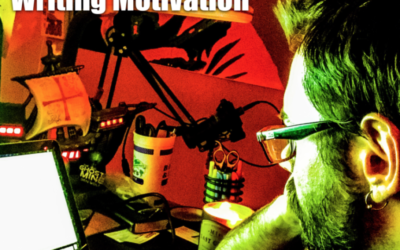The goal of National Novel Writing Month (NaNoWriMo) is to write 50,000 words in one month. I wrote double that in roughly the same amount of time.
Over the course of 34 days, I wrote 105k words and wrote an epic fantasy novel from start to finish.
30k of those words were written between Sunday and Saturday in the final week of that 30-day period.
This is a long post, so you’ve been warned, but I wanted to share some insights for you on how I was able to boost my productivity. (This is mostly applicable for fiction writers, but perhaps non-fiction writers will glean something from it as well.)
1. I had a self-imposed deadline with real-world consequences if I didn’t finish in time.
At the time I set out to do this, I was scheduled to teach and deliver a keynote talk at a writers conference the following month. I wanted to have print books available of this book, so it obviously had to be written in order for that to have a chance of happening.
It was a tight window, but I managed to get it edited and out to beta readers and returned to me in time to get the books printed. The cover got finished in time as well.
2. I had an outline, and I added to the outline as I wrote the actual story.
For me, outlining is crucial. Early on in my writing career, I tried pantsing, and it doesn’t work for me–except that I pretty much always pants my way through my outlines.
The main benefit I’ve found in using an outline is that I know what the major pivotal points in the story are, and thus I can use that framework as a guide for the rest of the story.
When I say I added to the outline as I wrote the actual story, I mean that when I initially wrote my outline, I didn’t describe every detail with pristine specificity. But there was enough in there to guide my writing as I churned out my first draft.
I knew where I was headed, but when I didn’t know what came imminently next, or when I reached the end of a writing session, I would type up some quick notes about what needed to happen in the story next once I started writing again.
3. I did an ENORMOUS amount of pre-work before I ever started writing.
I’ve had this idea rattling around in my head for a few years, now. I didn’t write any of it down until the summer of 2016 (I think), and I didn’t start developing it until the summer of 2017, give or take a few months.
To give you some perspective on my overall plan, I just finished Book One of the series, which is 105,000 words. Before that, I had written four prequel novellas, one for each of the four main characters in my series so I could get to know the characters better. (Those novellas are only available via my author newsletter, so they’re published but only sort of.) All together, those novellas total around 130,000 words in length.
That 130,000 words (those four novellas) took me all of last year to get onto the page, by the way.
And beyond those novellas, I have created what is referred to as a “story bible” that contains miscellaneous details about anything and everything that plays a role in my story world. That story bible is currently sitting at roughly 23,000 words and covers details like character info, setting info, cultural stuff, names of cities and countries, how different weapons work, and much, much more.
So, combined, I wrote about 153,000 words of pre-work before I ever started Book One.
Am I saying you HAVE to do this? Absolutely not. I’m saying that having done all of this pre-work already helped me write that 105,000 words of Book One a lot faster.
4. In addition to my deadline, I kept track of my daily word count.
This is something I picked up from James Scott Bell, who has written books for Writers Digest as well as a bunch of great thrillers. He uses a word count spreadsheet to track his progress.
At first, I was averaging between 1,600 and 2,000 words per day. I know that’s a lot for some people, but I’ve had short stretches in the past where I’ve written 6,000+ words per day, so I knew I was capable of more. My goal by the end of the month was to average 4,000 words per day.
Every now and then, I’d have a slow day, too, which screwed with the averages. A couple of days, I barely got over 200 words written. (In fairness to myself, I also edited a 40,000-word nonfiction book for an editing client during that time, so that took up a good chunk of time.)
But yeah, there were some days when I was unmotivated and/or downright lazy. And having a spreadsheet to track my progress forced me to consider the good with the bad. It showed me where I needed to improve, and coupled with my looming deadline, I realized I had to choose whether I was going to overcome my bad habits or whether I was going to defeat myself.
I chose to overcome. And by the time I finished, my daily average was hovering between 4,000-5,000 words per day, which exceeded my stated goal of 4,000.
5. In conjunction with the word count, I didn’t allow myself to break the chain.
Jerry Seinfeld swears by writing something every day. (Look it up if you don’t believe me.) His minimum is 100 words, and he marks his calendar every day he writes at least 100 words.
My spreadsheet is my calendar in this regard—it’s my tracking system. And in 34 days, I have written no fewer than 100 words each day (though I came perilously close two days: one at 180 words and another at 196 words).
The idea of not breaking that chain was a huge motivating factor for me, so I kept at it.
As a side note, I’m a bit of a workaholic. But that workaholic nature is a direct counter-response to my inherent laziness. So when I say I work seven days a week, I really do.
However, I’m working a lot now so I can eventually only work 5-6 days per week. I’m in a hole because I don’t have enough books ready to be published, and thus I’m not making enough money to NOT work more often. But that will change, eventually.
6. Lastly, I had accountability beyond myself.
I’m in two mastermind groups of sorts. I started one of those two groups, and the guys in that group have been watching me this whole month since I started writing.
Whether they wanted to know or not, I updated them with my progress regularly. They probably got sick of it or thought I was bragging, but really I was sharing with them so they could keep me accountable.
It’s not so much that I needed them to crack a digital whip to get me back on my game as it was that me telling someone about it made it more real for me. It raised the stakes. If I had faltered, all of these guys would’ve known about it, and then I’d feel like a lazy bum.
So I didn’t want to fail. I didn’t want to let these guys down.
It worked.
RESULTS
All of this combined to help me write an average of nearly 3,100 words per day over that 34-day period. That’s great, but I really want to average somewhere north of 4,000 words per day for a whole month.
As I said above, I averaged over 4,000 words during the final two weeks of that timeframe, so I know I’m capable of it. The last week of that timeframe, I wrote 30,000—and it would’ve been closer to 35,000 if I hadn’t been the driver on a road trip on that Saturday. (I only got 196 words written that day.) Still, that’s an average of 4,285-ish words per day.
On top of that, I have a new novel written that I didn’t have before, one that won’t need much rewriting because it doesn’t have many (if any) structural issues. (Early beta readers have confirmed this for me, so now I’m just hunting and killing typos and little, picky issues and inconsistencies in advance of my launch in April/May of 2019.)
But perhaps the most important result is that I proved to myself what IS possible, and I believe I can keep up this kind of consistency, more or less, over the upcoming months until this trilogy is completed.
In conjunction with that, I have no reason to believe that Book Two will go any differently. In fact, now that I know what COULD be achieved, I may even finish it in LESS time than I did with Book One.
After all, I now have an additional 105,000 words of pre-work done (Book One) to better prepare me for Book Two, so why shouldn’t it go better? (I’ll post an update about Book Two once I have data for that one.
A FEW OTHER NOTES
There are several other factors that need to be addressed so I don’t get too many of the same types of questions in the comments. Here they are:
– I have a LOT of editing experience. A lot. I freelance edit for my day job, and I occasionally coach other authors in fiction writing. So I have a pretty solid understanding of what needs to happen when I’m writing as well.
I’m not at all saying I’m perfect, but I am saying I have a lot of experience, and that helped me write a quicker and cleaner first draft than many other authors would be able to do.
– I have a LOT of craft training. I’ve taught at 40+ writers conferences nationwide since 2012, and I’ve attended a handful of other conferences as well. I’ve done my homework to learn the craft of writing—just about everything short of going for an MFA.
So that plays a huge role in my ability to write quicker, because I understand the fundamentals of what I’m doing.
– I’ve had to rid myself of a lot of distractions. I started turning off the wifi on my laptop to keep from checking Facebook every five sentences (sometimes literally).
I experimented with writing sprints as well. They sometimes worked, sometimes didn’t. But ridding myself of distractions helped me, a borderline ADD guy, more focused.
– I had a few days where the distractions were nearly overwhelming.
One day in particular, it seemed like everything was coming at me from every angle: a light bulb went out and I had to buy a new one. But the store didn’t carry it, so I bought a new light fixture instead. Then when I installed it, I realized the outlet it was plugged into was the problem and not the bulb, so I had wasted time and money on that.
Add that to a number of other equally annoying distractions that day, and it was horrible. But I still managed to get 5,000 words written that day. I just had to get them down whenever I could steal the time to write them.
– Along with the distractions piece, I realized I was more focused later at night. I already knew that about myself, but I hadn’t been able to really flex my late-night creative muscles for quite some time, so I’d learned to write during the day instead. But, by far, my most productive times were later at night—usually 10pm or later.
– Brain fog is definitely a concern. For example, getting my characters through a massive battle was easy, but the aftermath proved a lot harder. I literally couldn’t figure out how to get them back up to the surface level through a wooden hatch covered with dirt and grass.
So sometimes your brain just needs some rest. Other times, you just have to write through it, even if it’s terrible or rushed, so you can move on with the story. You can always edit it and do some rewriting later on if you need to. (I’ll be reworking that section for sure.)
– I understand my genre and am writing to a handful of specific target audiences. We’ll find out exactly how well my readers like what I wrote for them once I publish the book, but in the meantime, I’ve included specific elements and tropes (with my own twists of course) so they get what they’re expecting when they pick up a book in the types of fantasy sub-genres I’m aiming for.
Again, we’ll have to see how well it worked when I publish the book, but on the front end, it helped me write a little faster.
– Once I finished my nonfiction editing project, I didn’t have much other freelance work (by design, because I needed to get this book done) during the remainder of this stretch of writing projects.
I have a wife, and we have kids, so I had to wiggle and jive around their schedules to make this happen. Was I Father of the Year during this period? No. Husband of the Year? No. Did I run away and live like a hermit to achieve this? Also no.
The balance shifted a bit in our house, and now it will shift back some since I have a better handle on what I’m doing. If you want to have a chance of success in writing more, get your family on board. Educate them so they have proper expectations. Rely on them a bit more than usual to handle things for themselves. And do NOT squander the time they bless you with.
– Last of all, this is like my eighth or ninth finished book. Might even be higher than that, though I’ve only published two novels, a children’s book, and the aforementioned four novellas. So I’ve had a LOT of practice actually writing and finishing books.
I can tell you that the more books you write, the quicker you can probably learn to write. For me, it hasn’t really gotten “easier” because I’ve raised my standards with each new book I write, but certain aspects of it go “quicker” now that I’ve been through this process so many times.
MY ENCOURAGEMENT TO YOU
I’m not saying you have to write 100,000 words in a month. I’m not making any demands or requests of you. I’m not even going to challenge you to write more. I’m simply encouraging you that it can be done.
Go forth and write, my friends. Write more this month than you did last month.
If anyone has questions, post them in the comments, and I’ll try to respond.





It helps to not have a full-time day job, which unfortunately most people have. Also, how do you deal with the physical wear and tear that comes from writing large quantities of words each day?
You are totally right. I didn’t have a FT job while doing this level of writing, and it did allow me a lot more freedom. I did, however, have to “buy” time away from my day job work (freelance editing and other publishing services) so I could justify doing this writing.
In terms of the wear-and-tear, at the time, I was exercising anywhere from 3-5 times per week doing a mix of jiu jitsu and kickboxing classes–mostly jiu jitsu, though. It helped keep me sane and limber while working.
Later, due to an injury to my neck, I ended up writing most of the subsequent book and all of the third book in the Blood Mercenaries series from my recliner, as it was the only place I could write and work without constant pain. Thank heavens that is fixed now (my chiropractor is a Godsend).